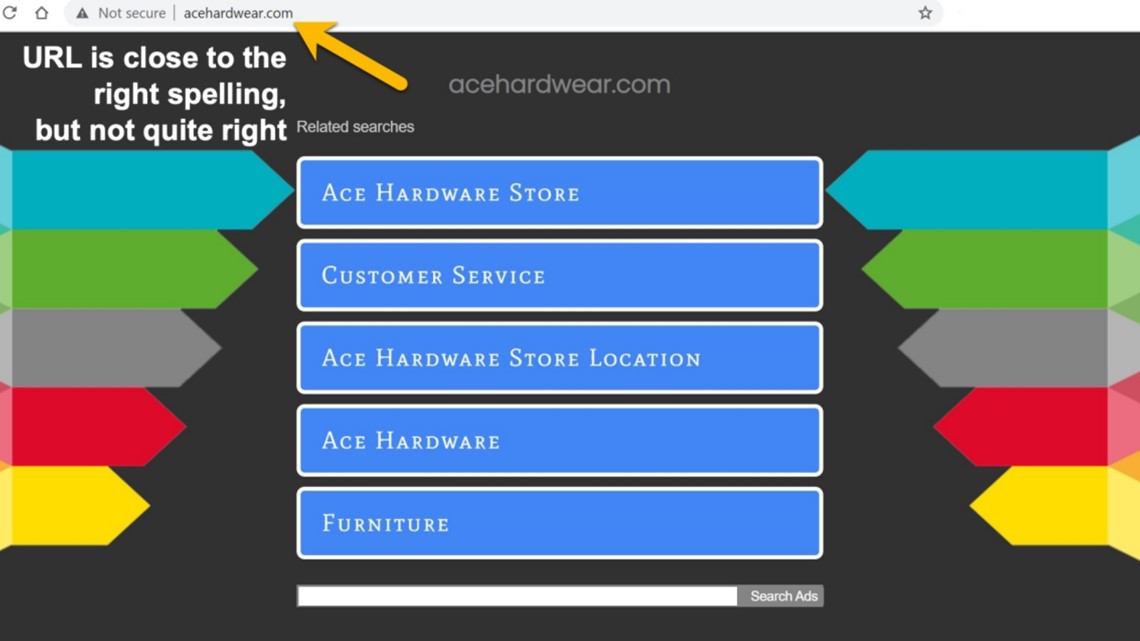The holiday season is upon us and that means many Americans will shop for gifts online.
Online purchase scams were among the top three riskiest scams reported by consumers in 2023, making up more than 40% of scams reported to the Better Business Bureau (BBB) Scam Tracker.
More than 80% of people who reported online purchase scams in 2023 also said they lost money, according to the BBB.
VERIFY readers often ask us about whether a product advertised online is a scam – like these ads that falsely claim the hosts of “Shark Tank” and actor Kevin Costner endorsed products to treat tinnitus.
We compiled five key tips to help you avoid online shopping scams.
THE SOURCES
WHAT WE FOUND
1. Research any online retailers:
If you’re buying from any online retailer, the BBB recommends that you do your research before making a purchase.
The FTC and AARP recommend searching for the company’s name in a search engine like Google using words like “review,” “scam,” or “complaint” to see what other people are saying about their experience with a seller. If the company is scamming people, you’ll likely see negative reviews from other shoppers.
Other places to check for complaints about a company include social media and consumer safety websites such as the BBB Scam Tracker.
It’s also important to make sure the company’s address and phone number are genuine. If there is no indication of a brick-and-mortar address, or the address shows a parking lot or another business on Google Maps, you’re likely dealing with a scammer.
2. Look for misspellings in the URL:
Be sure to look at the URL of a new website. It might be very close to the domain name for a legitimate business, but with misspellings or misplaced letters.
Here’s an example from the BBB that uses URL acehardwear.com instead of the legitimate acehardware.com:


Some scammers also may try to trick you by using a subdomain. For example, a scammer might create a website that looks like this: netflix.com.movies.com. They’re hoping you won’t notice the real domain name is actually movies.com, the BBB says.
You can use a website checker like Google’s Safe Browsing tool to help you determine if a website is safe. Lookup services like this one can also show you when a domain was created. A new website or copyright date for a website often indicates a scam.
AARP also recommends going directly to trust sites rather than finding them through a search engine. That’s because scammers can pay for placement so their fake sites appear at the top of search results.
3. Avoid deals that are too good to be true:
If the prices on the website seem too good to be true, they probably are. Be skeptical of any website that is selling products far below their retail value.
For example, a California resident who was scammed told the BBB they found a sale on Facebook listing three pairs of HOKA shoes for $99. But one pair of those shoes often retails for over $100.
If every other retailer is sold out of a popular product and another website has it at an extremely discounted price, that’s also a red flag, AARP says.
4. Pay with a credit card instead of debit:
Central Trust Bank and the FTC recommend that you pay with a credit card instead of a debit card while online shopping. Credit cards aren’t tied directly to your bank accounts like debit cards are and can also offer greater fraud protection.
Federal law limits your responsibility for fraudulent credit card charges to $50 if the victim reports the fraud in a timely manner and some companies offer full protection. Debit cards don’t offer those same protections.
The FTC adds that you should never buy from online sellers who demand payment through gift cards, wire transfers, payment apps or cryptocurrency.
5. Look for delivery, exchange, refund and return policies:
Make sure the online business has delivery, exchange, refund and privacy policies. If these are “vague or nonexistent, take your business elsewhere,” AARP says.
If you aren’t convinced that a shop’s policies are legitimate, copy and paste them into your web browser to see if they’ve been taken from another website.
Legitimate online shopping websites should also have detailed complaint or dispute handling processes in case something goes wrong with your order.
How to report suspected online shopping fraud:
- BBB: File a complaint online or report a scam to the BBB Scam Tracker.
- FTC: File a complaint online or call 877-FTC-Help.
- Facebook: Report advertisements that violate Facebook policies. Read more about how to report an ad here.
- Instagram: Report policy violations online.
- FBI: Submit an internet crime complaint online.











